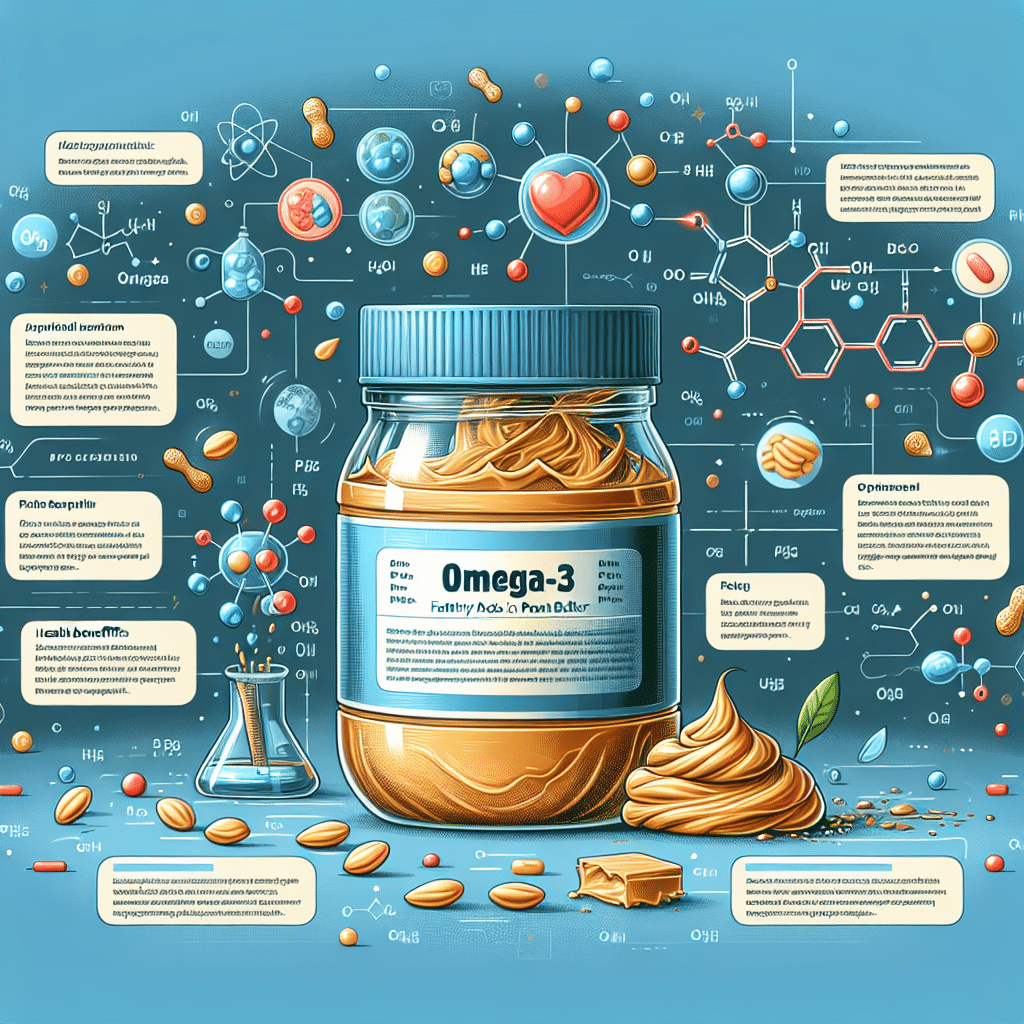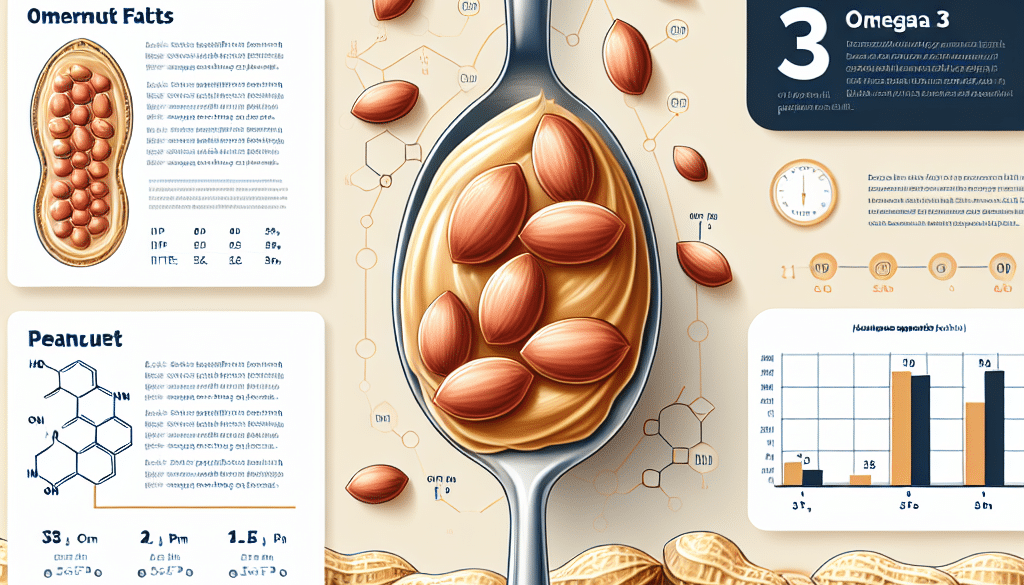Omega 3 in Peanut Butter: Fatty Acid Facts
-
Table of Contents
- Omega-3 in Peanut Butter: Unveiling Fatty Acid Facts
- Understanding Fatty Acids in Peanut Butter
- The Omega-3 Content in Peanut Butter
- Health Benefits of Omega-3 Fatty Acids
- Improving the Omega-3 to Omega-6 Ratio
- Case Studies and Statistics
- Conclusion: Balancing Your Fatty Acid Intake
- Discover ETprotein’s High-Quality Protein Products
Omega-3 in Peanut Butter: Unveiling Fatty Acid Facts

When it comes to healthful eating, omega-3 fatty acids are often at the forefront of nutrition discussions. Known for their anti-inflammatory properties and potential to reduce the risk of chronic diseases, omega-3s are typically associated with fish and flaxseeds. However, the presence of omega-3 in peanut butter is a topic that has piqued the interest of health enthusiasts and food scientists alike. In this article, we will delve into the fatty acid profile of peanut butter and explore the facts surrounding omega-3 content in this popular spread.
Understanding Fatty Acids in Peanut Butter
Peanut butter is a staple in many households, cherished for its creamy texture and rich flavor. But beyond its taste, peanut butter’s nutritional profile is also noteworthy, particularly regarding its fatty acid composition.
- Monounsaturated Fats: The majority of the fat in peanut butter is monounsaturated, which is considered heart-healthy.
- Polyunsaturated Fats: Peanut butter also contains polyunsaturated fats, which include omega-6 and omega-3 fatty acids.
- Saturated Fats: A smaller portion of peanut butter’s fat content is saturated, which should be consumed in moderation.
While peanut butter does contain some omega-3 fatty acids, it is predominantly a source of omega-6 fatty acids. The balance between omega-6 and omega-3 fatty acids in the diet is crucial for maintaining health.
The Omega-3 Content in Peanut Butter
Peanut butter is not typically known for its omega-3 content. In fact, the amount of omega-3 in peanut butter is relatively low compared to its omega-6 content. The primary type of omega-3 found in peanut butter is alpha-linolenic acid (ALA), which is a precursor to the more potent eicosapentaenoic acid (EPA) and docosahexaenoic acid (DHA) found in fish oils.
However, the conversion rate of ALA to EPA and DHA in the body is quite low, which means that while peanut butter can contribute to your omega-3 intake, it should not be relied upon as a primary source.
Health Benefits of Omega-3 Fatty Acids
Omega-3 fatty acids are essential for various bodily functions and have been linked to numerous health benefits:
- Heart Health: Omega-3s can reduce the risk of heart disease by lowering blood pressure, reducing triglycerides, and decreasing the risk of arrhythmias.
- Brain Health: These fatty acids are crucial for brain development and function and may help protect against cognitive decline.
- Inflammation: Omega-3s have anti-inflammatory properties that can help manage conditions like rheumatoid arthritis.
Given these benefits, it’s important to include omega-3-rich foods in your diet. While peanut butter contains some ALA, it should be complemented with other omega-3 sources.
Improving the Omega-3 to Omega-6 Ratio
The modern diet tends to be disproportionately high in omega-6 fatty acids, which can promote inflammation when not balanced with omega-3s. To improve this ratio, consider the following:
- Increase your intake of omega-3-rich foods like fatty fish, flaxseeds, chia seeds, and walnuts.
- Choose peanut butter brands that may be fortified with additional omega-3s or have a better omega-6 to omega-3 ratio.
- Limit processed foods and oils high in omega-6, such as soybean, corn, and sunflower oils.
Case Studies and Statistics
Research has shown that incorporating omega-3 fatty acids into one’s diet can have significant health benefits. For instance, a study published in the Journal of Nutrition found that higher ALA intake was associated with a lower risk of cardiovascular disease. Additionally, the American Heart Association recommends eating two servings of fatty fish per week to meet omega-3 requirements.
Despite these recommendations, the average American diet is still lacking in omega-3s. According to the National Institutes of Health, most Americans consume more than ten times the amount of omega-6 than omega-3, which can lead to an imbalance and potential health issues.
Conclusion: Balancing Your Fatty Acid Intake
In conclusion, while peanut butter does contain omega-3 fatty acids, it is not a significant source of these essential nutrients. To reap the health benefits of omega-3s, it’s important to consume a variety of omega-3-rich foods and maintain a balanced ratio with omega-6 fatty acids. Peanut butter can still be part of a healthy diet when consumed in moderation and as part of a balanced nutritional plan.
Discover ETprotein’s High-Quality Protein Products
If you’re looking to enhance your diet with high-quality protein sources, consider exploring ETprotein’s range of organic bulk vegan protein and plant proteins. Their products, including peanut protein, are designed to cater to a variety of dietary needs and preferences, ensuring you receive the best in taste and nutrition.
About ETprotein:
ETprotein, a reputable protein Chinese factory manufacturer and supplier, is renowned for producing, stocking, exporting, and delivering the highest quality organic bulk vegan protein and plant proteins. They include Organic rice protein, clear rice protein, pea protein, clear pea protein, pumpkin seed protein, sunflower seed protein, mung bean protein, peanut protein etc. Their offerings, characterized by a neutral taste, non-GMO, allergen-free attributes, cater to a diverse range of industries. They serve nutraceutical, pharmaceutical, cosmeceutical, veterinary, as well as food and beverage finished product distributors, traders, and manufacturers across Europe, USA, Canada, Australia, Thailand, Japan, Korea, Brazil, and Chile, among others.
ETprotein specialization includes exporting and delivering tailor-made protein powder and finished nutritional supplements. Their extensive product range covers sectors like Food and Beverage, Sports Nutrition, Weight Management, Dietary Supplements, Health and Wellness Products, and Infant Formula, ensuring comprehensive solutions to meet all your protein needs.
As a trusted company by leading global food and beverage brands and Fortune 500 companies, ETprotein reinforces China’s reputation in the global arena. For more information or to sample their products, please contact them and email sales(at)ETprotein.com today.












